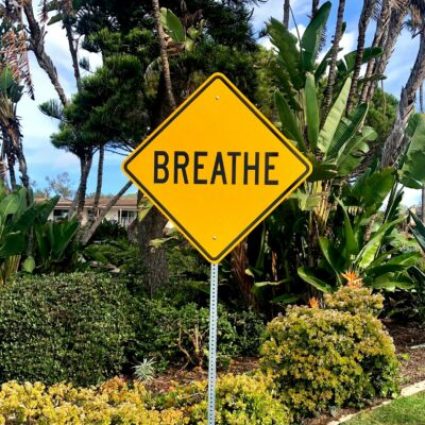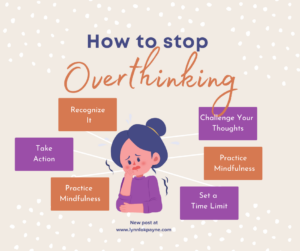When we can feel overwhelmed, our thoughts and emotions can spiral downward. This can bring us into a state where we feel we can’t cope. Decisions that are usually easy, like what to make for dinner, seem difficult.
Being overwhelmed can take a toll on your health, both mentally and physically. Stress can move our minds toward the negative or even irrational thoughts. We can develop headaches, stomachaches, a racing heartbeat, shallow breathing, and other physical symptoms. Or we can go into flight, fight, or freeze mode where we can’t function normally or even at all.
Life gives us many reasons to feel overwhelmed, whether it’s a major life change, like the loss of a loved one or from something minor, such as running late. And when things pile up, it can feel like the chaos will never end. I’ve had many times in my life when the stress was too much. We all have. Then I would ruminate, which just increased my stress and feeling overwhelmed, and made matters worse.
I don’t know about you, but I discovered a lot of my stress is self-imposed. Unrealistic expectations can be set, like wanting a task to be perfect or a timeline that’s not practical. I’ve found that if I can step back from the situation and switch my perspective, I can lessen the feelings of being overwhelmed.
The first place to start is to identify what is causing your stress and why you feel overwhelmed. Once you can identify the source, then you can find strategies to help you deal with it.
Second, create a stress management plan. This is your go-to list of relaxation techniques when you feel overwhelmed. The list could include meditation, walking outside, deep breathing, exercise, or yoga. Just a few minutes spent on something that is relaxing can put you in a better place.
Finally, ask for help. This may be a close friend or a medical professional. A good therapist can help you manage stress and create a plan that will work for you. It’s not weak to ask for help. It’s a sign of strength that you need help and want to get better.
When we have chronic stress, we may not realize how bad it is because our base line keeps rising with each additional stress. When this happens, we can live in fight, fright, or freeze mode much of the time. And this is not good for the body or mind.
20 Tips to Help You When You Feel Overwhelmed
Set realistic goals. Don’t do too much at once, or you’ll just set yourself up for failure. Break down large tasks into smaller, more manageable steps. And don’t feel like everything has to be done right away because it doesn’t. I struggle with this one myself.
Drop the idea of perfection. This can really mess with our mind and increase stress. And when stress gets to be too much, procrastination can set in. It’s better to get it done and off your to-do list. A good question to ask yourself is, “Will spending more time on this task be beneficial?” If the answer is not much, then finish it and move on to something else.
Delegate or source out tasks. If possible, delegate tasks to others to free up your time for more important projects or just to give yourself a break.
Clean up. Mess = stress. If your work or home area are messy, it will create stress. Even if the mess is in the closets or behind cabinet doors, it can affect stress levels. Son’t overwhelm yourself trying to get it all done at once. Take one drawer or cabinet a day and clean it up. Get rid of things you haven’t used. And save big areas, like closets or a room for the weekend.
Revise your self-talk. Rather than saying, “I feel overwhelmed,” instead, speak this, “This too shall pass.” Or “Even though I feel overwhelmed at this moment, I know that it’s just a temporary state.”
Practice gratitude. Taking the time to appreciate the good things in life can help to shift your focus away from stress. Gratitude will change your outlook and has the power to cleanse and restore the mind, body, and spirit. What we seek, we find.
Take breaks. Even just a few minutes of doing something relaxing, such as taking deep breaths or a short walk, will help. Breaks are important to rest the mind. It helps you to decompress, restore your energy, can help with creativity. I know when I’m blocked, a short walk can bring in a solution.
Shake it out. Get up and shake your body. This helps to release the stuck energy and signals the brain that danger has passed and calms the body down. Animals shake to release pent up fear or anxiety. It’s a natural way to release tension. Next time you feel stressed, you can Shake It Off like Taylor Swift.
Practice Self-Care
Here are some benefits of self-care: it increases happiness and energy, reduces stress and anxiety, boosts self-esteem. Self-care helps us to deal with challenges better and be more adaptable to change. It also supports mental, emotional, spiritual, and physical health. Try to aim to do something every day that brings in happiness.
Reward yourself. When you complete a task, take some time to do something you enjoy as a reward. Maybe it’s a walk by the lake, a warm cup of tea, a pedicure, or making s’mores. Do whatever gives you joy and puts a smile on your face. You’ve earned it.
Take a warm bath or shower. A warm bath or shower helps to relax muscles, and if you take it right before bed, can aid in sleeping longer and better. Warm water calms the nervous system and improves circulation. Imagine the water taking away all of your stress and sending them down the drain.
Get a massage. It moves the energy in the body, which will help to reduce muscle tension and increase relaxation. Massage increases circulation and flexibility and decreases joint inflammation and stiff muscles. Plus, it can help to strengthen the immune system and reduce feeling overwhelmed.
Social time. Schedule time to spend with your family and friends. Their support can help to ease burdens, bring in more happiness, and help to appreciate what we already have. Connection is important to overall well-being and gives meaning to our lives.
Listen to music. Listening to calming music can help to reduce stress, aid in pain relief, and improve mood. Studies have shown that music can release endorphins, the feel good hormone, and increase serotonin, which regulates moods. It can help with sleep quality, lower blood pressure, and improve concentration and memory. Music is indeed healing medicine.
Read a fiction book. Reading transports us to a different world and gives us a break from our lives. It takes us out of our head and life and into someone else’s story. It’s an adventure from the comfort of our own home.
Laugh. Watch a funny movie or comedy show. Laughter is a great way to relieve stress, release tension, and improve your mood. It decreases cortisol levels and increases endorphins. Laughter is healing.
Spend time in nature. It reduces fatigue and stress levels and has a calming effect that allows more serenity, peace, and tranquility to enter. Plus, it shows us how everything is interconnected in the world.
Stay hydrated. Drink water because it can help to lower stress levels. If you’re dehydrated, your body will increase cortisol levels, the stress hormone. This can lead to fatigue, decreased brain function, and anxiety. We also need water to create serotonin, the happy hormone. Who doesn’t want some more of that?
Eat healthy. Incorporate more fruits and veggies into your diet. Fiber helps the bacteria in the gut and the gut produces most of our body’s serotonin, the happy hormone. Try to decrease or eliminate foods that can increase anxiety, like coffee, alcohol, sugar, and processed foods. Do a little at a time. If you try to cut back or out all at once, you may feel overwhelmed, which is the opposite of what we are going for.
Make sleep a priority. It has a big impact on how we feel. Getting a good night’s rest improves our brain function and gives us energy to take on the challenges of the day. Many sleep experts state that a sleep routine is important. Go to bed and get up about the same time each day. Research suggests that it can help you get a better night’s sleep.
Feeling overwhelmed isn’t something we can avoid. But with the above techniques, we can reduce stress. And make self-care a priority. Think about the advice they give us on a plane: Put on your oxygen mask first before helping someone else. If you don’t take care of yourself first, how much help can you be to others? When we take care of ourselves, we have so much more to give. So, take care of yourself. You are worth it!





